Curious minds
Usually you will see that brilliant people are curious at hearts. Curiosity is an important trait of successful people. Thomas Edison, Leonardo da Vinci, Albert Einstein, Richard Feynman, Steve Jobs, and Mark Zuckerberg are all curious and observant people. Richard Feynman the man of Quantum Mechanics was especially known for his adventures which came from his curiosity. These people at their core are very observant; they notice things with a difference and are drawn to interesting things.
When we are curious, we see things differently; we use our powers of observation more fully. We sense what is happening in the present moment, taking note of what it is regardless of what it looked like before or what we might have been expected of it to be. Curiousness keeps us alive and engaged. It helps us increase our capability and helps us in embracing opportunities, in making new connections, and experience moments of insights and meaning. All of this provides the foundation for a rich, aware and satisfying life experience.
Curiousness makes our minds active instead of passive. Inquire, ask questions, observe, and search for answers. Since the mind is like a muscle which becomes stronger through continual exercise. More questioning brings newer ideas. It seems Mozart’s mind was so curious that he would keep experimenting with notations to produce newer symphonies – at times in one sitting in a single act of inspiration. He would edit or rework on his compositions also in one sitting. Great artists, scientists, engineers, doctors, executives, entrepreneurs are all curious. Ayn Rand also has quoted that curious people are creative at heart and when they get hyper creative it leads to achieve success. In her words “There’s no doubt about it – your hyper creative mind operates on a different level. You listen to people around you who long to rejuvenate their creativity.”
Curiousness opens new possibilities. We see new world which normally is not visible. I strongly believe that the life of curious people is far from boring. There are always new things that attract their attention. Bill Gates proposes the corporate world a different approach, where the businesses using its technology & resources get into the field of philanthropy directly. He urges the businesses to explore the unexploited business opportunities available in the sub-saharan African countries and thereby improving the lives of the less privileged people. He urges the corporations to donate huge amounts of money, resources or employees time for those who cannot afford it. By doing so, they get ready to take chances and look at different alternatives. What would the businesses get in return? Recognition as do-gooders which will improve the company’s reputation and in turn improves the profits. What should this be called? Maybe we could call it Creative Capitalism.
 Curious people most importantly keep an open mind. They are ready to learn and relearn. I think curious people except realities more easily. They are ready to accept possibilities of change. For Dr.Homi J Bhabha – the nuclear man of India using thorium rather than uranium shows his in-depth study on nuclear power and his ever curious mind which kept working wonders for India’s nuclear power. He is credited with formulating a strategy of focusing on extracting power from the country’s vast thorium reserves rather than its meager uranium reserves. His thorium focused strategy was in marked contrast to all other countries in the world. The approach proposed by Bhabha to achieve this strategic objective became India’s three stage nuclear power program.
Curious people most importantly keep an open mind. They are ready to learn and relearn. I think curious people except realities more easily. They are ready to accept possibilities of change. For Dr.Homi J Bhabha – the nuclear man of India using thorium rather than uranium shows his in-depth study on nuclear power and his ever curious mind which kept working wonders for India’s nuclear power. He is credited with formulating a strategy of focusing on extracting power from the country’s vast thorium reserves rather than its meager uranium reserves. His thorium focused strategy was in marked contrast to all other countries in the world. The approach proposed by Bhabha to achieve this strategic objective became India’s three stage nuclear power program.
And notably people with curiosity don’t take things for granted. For them learning new things is fun. Learning is an unending process. All you curious people out there – try to pick a book on a new subject, surf internet on a new topic, watch diverse topic program on television, make friends from diverse areas than yours and let it feed your mind with the excitement of a new world.














































